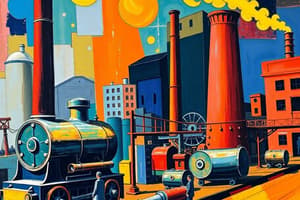Podcast
Questions and Answers
Who is Edwin L. Drake?
Who is Edwin L. Drake?
- Founded the American Federation of Labor
- Used a steam engine to drill for oil (correct)
- Developed the Bessemer process
- Inventor of the typewriter
What is the Bessemer process?
What is the Bessemer process?
A cheap and efficient process for making steel developed around 1850.
Who was Thomas Alva Edison?
Who was Thomas Alva Edison?
An inventor who created the world's first research lab and invented the light bulb and electrical power.
Who invented the typewriter?
Who invented the typewriter?
What significant invention did Alexander Graham Bell create?
What significant invention did Alexander Graham Bell create?
What is the Transcontinental Railroad?
What is the Transcontinental Railroad?
Who was George M. Pullman?
Who was George M. Pullman?
What was Credit Mobilier?
What was Credit Mobilier?
What was the outcome of Munn v. Illinois?
What was the outcome of Munn v. Illinois?
What did the Interstate Commerce Act of 1887 establish?
What did the Interstate Commerce Act of 1887 establish?
Who was Andrew Carnegie?
Who was Andrew Carnegie?
What is vertical integration?
What is vertical integration?
What is horizontal integration?
What is horizontal integration?
What is Social Darwinism?
What is Social Darwinism?
Who started the Standard Oil Company?
Who started the Standard Oil Company?
What was the purpose of the Sherman Antitrust Act?
What was the purpose of the Sherman Antitrust Act?
Who was Samuel Gompers?
Who was Samuel Gompers?
What is the American Federation of Labor?
What is the American Federation of Labor?
Who is Eugene V. Debs?
Who is Eugene V. Debs?
What was the Industrial Workers of the World?
What was the Industrial Workers of the World?
Who was Mary Harris Jones?
Who was Mary Harris Jones?
Study Notes
Edwin L. Drake
- Pioneered the steam engine method for oil drilling in Titusville, PA, initiating an oil boom.
Bessemer Process
- Innovated around 1850, this process provided a cost-effective and efficient means to produce steel.
Thomas Alva Edison
- Established the first research laboratory; known for inventing the light bulb and advancing electrical power.
Christopher Sholes
- Created the typewriter, revolutionizing communication and work practices.
Alexander Graham Bell
- Invented the telephone in 1876, facilitating the development of a global communications network.
Transcontinental Railroad
- Completed in 1869, this railroad connected the Atlantic and Pacific coasts of the United States.
George M. Pullman
- Founded a factory for railroad car manufacturing and created a company town for workers, known for its strict regulations.
Credit Mobilier
- Formed in 1864 by Union Pacific Railroad owners, this construction company embezzled railroad profits through fraudulent practices.
Munn v. Illinois
- In 1877, the Supreme Court upheld state regulation of railroads to benefit farmers and consumers, affirming governmental authority over private industries for public interest.
Interstate Commerce Act
- Enacted in 1887, this law aimed to regulate railroad activities federally, establishing the Interstate Commerce Commission.
Andrew Carnegie
- Founded the Carnegie Steel Company, symbolizing the rise of the steel industry and the modern economy.
Vertical Integration
- An economic strategy where a company controls its suppliers, distributors, and transportation, ensuring quality and cost management.
Horizontal Integration
- Involves merging companies producing similar products, leading to increased market share and reduced competition.
Social Darwinism
- A philosophical concept erroneously linked to Darwin's theories, promoting unregulated competition as necessary for societal progress.
John D. Rockefeller
- Established the Standard Oil Company, using a trust to dominate the oil industry in America; known for philanthropic contributions.
Sherman Antitrust Act
- Passed in 1890, aimed at preventing monopolies by making the establishment of trusts that hindered free trade illegal, though enforcement proved challenging.
Samuel Gompers
- Led the Cigar Makers International Union, advocating for better working conditions, wages, and hours.
American Federation of Labor
- Formed in 1886 as an alliance of trade and craft unions, emphasizing organization for greater influence.
Eugene V. Debs
- Key figure in attempts to create the American Railway Union; associated with socialist movements.
Industrial Workers of the World
- A labor union for unskilled workers, founded in 1905 by radical unionists and socialists to advocate for workers' rights.
Mary Harris Jones
- A significant figure in the women's labor movement, known for her activism during major strikes and her efforts to end child labor.
Studying That Suits You
Use AI to generate personalized quizzes and flashcards to suit your learning preferences.
Description
Test your knowledge with these flashcards covering important figures and innovations from US History Chapter 14. Learn about key developments such as the Bessemer process and the contributions of Edwin L. Drake and Thomas Edison. Great for review and study!




